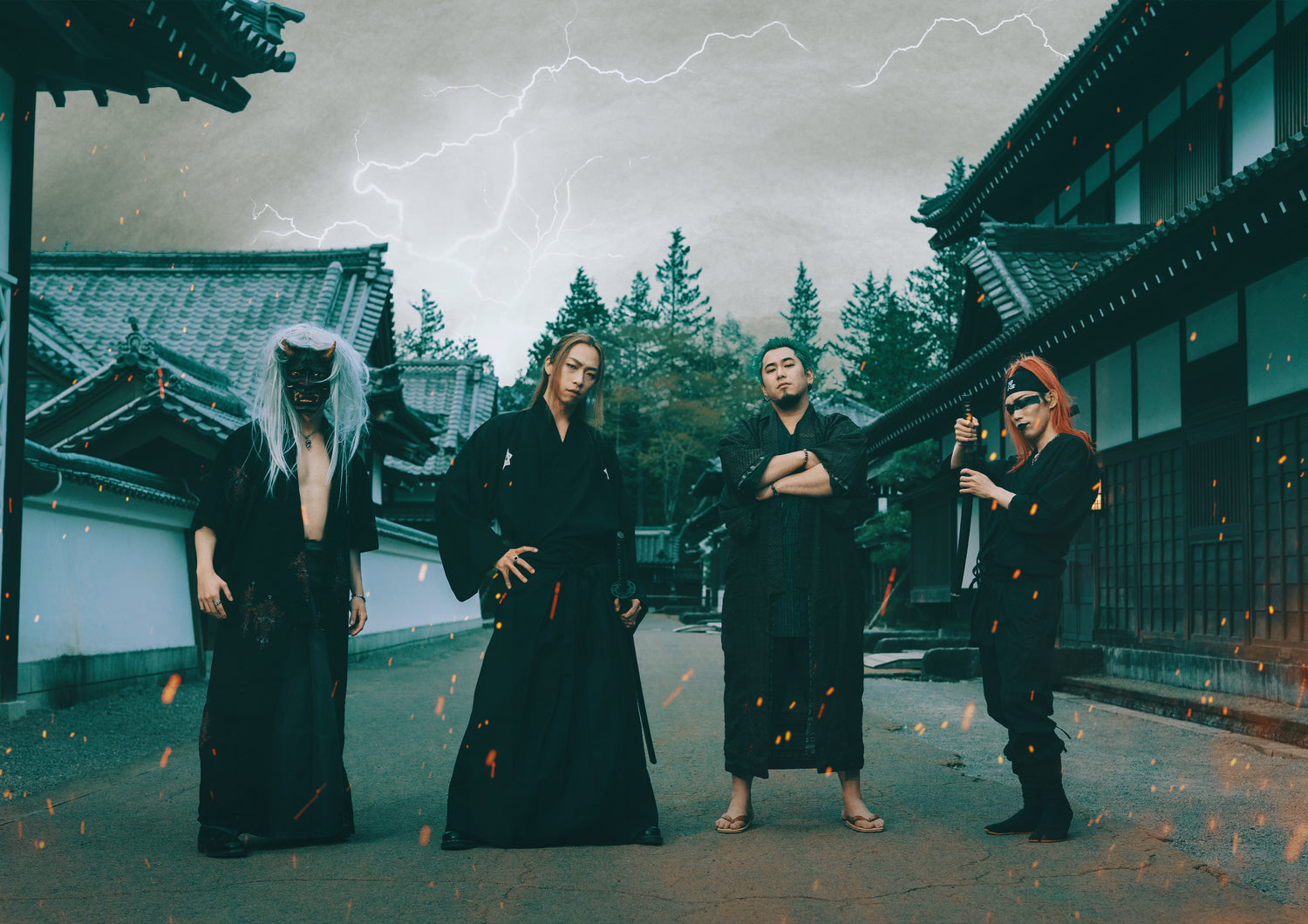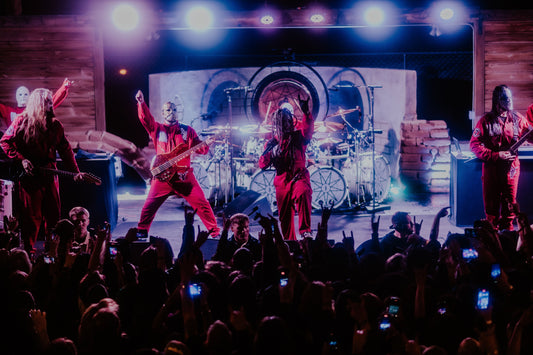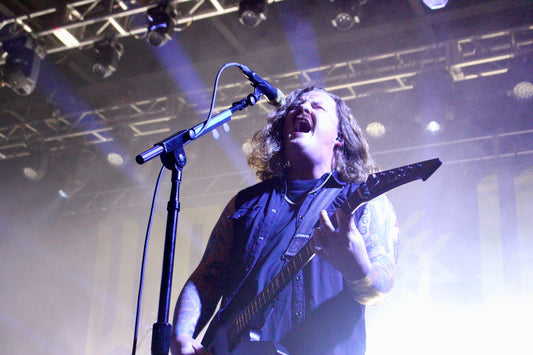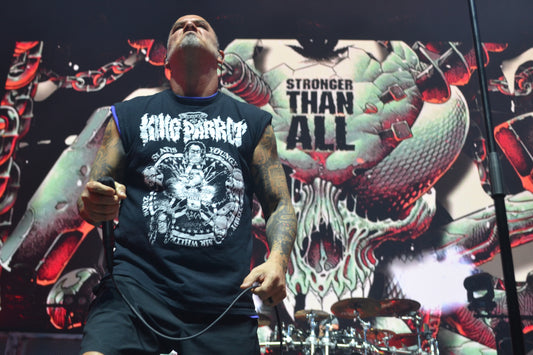Initially forming under the moniker Gyze in 2011, modern samurai metal practitioners have established their rank as Ryujin. Over the last decade plus, the band has released a consistent succession of four albums – all showcasing a massive meld of traditional Japanese instrumentation with shred-heavy power metal of epic proportions.
Sourcing inspirational cues ranging from ancient orchestral Gagaku to contemporary anime, Ryukin offers a succinct cultural meld packaged into a powerful metal album. Combining a well-versed heavy metal pedigree along with traditional Japanese instrumentation including the Shamisen, Dragon Flute, Erhu and Taiko - Ryoji Shinomoto's artistic amalgam comes to life.
Fusing a love and admiration for extreme Scandinavian metal along with a profound reference for their own Japanese heritage makes for a body of work that stands alone in contemporary heavy music.
Aligning with ally and kindred creative spirit Matthew Kiichi Heafy of Trivium to serve as the project's producer, the album showcases a brave blend of timelessness and progression, both in style and execution that make for definitive self-titled release.
In addition to his role as producer on the album, Ryujin also boasts multiple appearance from Heafy as well as contributions from Mukai Wataru of the Kansai Philharmonic Orchestra. Combining Japanese and English lyricism - the album also sources thematic inspiration from the words of the Ainu people of Hokkaido, the band's home region.
Ryukin also incorporates a cultural component that emphasizes Japanese works in literature and art as reference material resulting compelling metal soundtrack that introduces Samurai metal with a sense of reverence and sophistication - rather than a hook or gimmick.
Reflecting on the reintroduciton of Ryujin, mastermind Ryoji Shinimoto spoke about the significance of the record and the statement in stamping the effort, Ryujin. He also offered high praise of collaborator Matt Heavy and drew parallel lines between Scandinavian metal and the subculture of Japanese anime.
After more than a decade as a band and four full length releases, what about this record was deserving of being a self-titled release? That is a very definitive move.
Ryoji - The name change is certainly a major event in the band's history. However, the band also had a long period of rest after the Corona shock. It was the only chance now to make a fresh start. Especially since the pronunciation problem regarding GYZE has been with us for a long time. We don't intend to become another band. We still play our old songs; we were called SUICIDE HEAVEN before GYZE.
But I believe that the start of RYUJIN will be a good album with a good future. Besides, Matt and Napalm Records were also positive about this name change.
How important was Matthew Heafy’s involvement in the project? As both producer and collaborator, do you feel like he was vital in achieving your full creative potential?
Ryoji - As for this album, it would never have been possible without Matt. He played such an important role.
Especially the introduction of clean vocals and the selection of songs. This was a major undertaking by Matt. You can hear my clean vocals everywhere, and he was my vocal coach in the lead up to the recording. As for the songs, 'Raijin & Fujin' is a complete collaboration, with Matthew writing the guitars and vocal lines, and me developing and finishing them. No, it is not an exaggeration to say that he composed the song itself. I wrote the guitar solo, rhythm track, orchestration, and the rest of the song except for the chorus.
I also wrote 'The Rainbow Song', which became a single cut, and I thought it might be too pop. He recommended it to me, and it came to fruition! I never thought I would ever sing a ballad! But he knew the way and the art of making a band good.
The other songs were chosen by him out of many demos. I think you can understand from this that he played a very important role.
Japanese culture is integral to Ryujin’s sound - from the instrumentation to the themes of the songs. Was there ever a concern of a culture clash? Did you find it difficult to show reverence for your culture with such an aggressive sound?
Ryoji - Yes, it is. It is true that Japanese culture and metal music are far from each other, so it can be difficult. So it is very important to find a balance. If you introduce too much Japanese culture, it will become just a folk song, and it won't become metal. But I like to incorporate culture and thought.
Ibaraki by Matt has more mythology than we do, but it's very well integrated! I used to be a dragon flute player at a shrine a few years ago, so I have my own respect for Japanese culture. As for our music, it's hard to make it Japanese without study and knowledge. I am still learning from all kinds of music. I especially listen to Akira Ifukube, a classical musician who pioneered the introduction of Japanese music. Without him, there would be no Joe Hisaishi, the composer of Ghibli.
Also, I wasn't really aware of it myself, but I hear that my music has an atmosphere like that of an anime song. Just the other day I read a review in the Finnish media that said that RYUJIN would be like Ryujin's music if Ensiferum was born in Japan and grew up listening to anime. I saw an article that said, "If Esiferum was born in Japan and grew up listening to anime, it would be like Ryujin! It was very interesting.
This album seems to have breakout potential for Ryujin. Did you get that sense when you were in the studio and watching these compositions come together?
Ryoji - Thank you! It's an honor.
I just focused on making music with all my might, so I've never really felt that way. However, as I said earlier, it was produced by Matt and released on Napalm Records, so I had high expectations and was excited. There are some types of songs that I haven't seen before! No matter what, I want to continue making the music I love!
“The Rainbow Song” and "Saigo No Hoshi" are great examples of how Ryujin has evolved stylistically on this record. Did you see it as a risk in doing something different like using clean vocals on this album?
Ryoji - Actually, that song was originally written for me to enjoy with the vocal aid of Hatsune Miku. So when it was decided that I would be recording the song, I was a little surprised and didn't know how to sing it. I asked Matt over and over again. I didn't think of it as a risk. Because all of them are definitely composed by me. In the end, it turned out to be very good. I would like to continue to take on new challenges. However, there are some good points that don't change, so I think it would be good if they all had a good balance.
What brought about the decision to cover Linked Horizon’s anime hit “Guren no Yumiya”?
Ryoji - This was also a request from Matt! He's a fan of Attack on Titan. Actually, I'm embarrassed to say that I had never heard it until I covered it. I'm always amazed at the greatness of Japanese anime culture. Just like Scandinavian metal culture, Japan is all about anime. Anime and music are inseparable, so I feel very proud!
The band does an incredible job of melding the theatrics of power metal and the technicality of thrash. What are some of the bands that have inspired Ryujin stylistically?
Ryoji - I don't think metal is a direct influence on this style. Movie music, classical music, anime, and actual folk songs. However, a big part of the style is Scandinavian metal from the 90s and 00s. But that's not all, I always liked KISS, and when I first started listening to rock, I started listening to Jrock as well. Old Jpop, especially songs from the 70s and 80s. And we also played punk rock. So I think everything came together in a nice way and created my own musical style.
With this self-titled record being your first in five years, how long have you been living with some these songs? What does it feel like finally sharing them with the world?
Ryoji - The oldest idea includes a melody from when I was 20 years old! So it's been almost 15 years. (Laughs) - That's the chorus of 'Dragon, Fly Free'.
However, I released about 5 singles in 2021 and 2022, so it was fulfilling, so it doesn't feel like it's been that long. This time I had a lot of time to prepare for things like record contracts and management. I actually thought it would be released in 2022 at the earliest, or 2023 at the latest.
I'm still writing new songs, so it would be fun if I could release them in a shorter span of time!
---------------------------
Ryujin, the self-titled album is now available via Napalm Records.
Order the album - HERE





